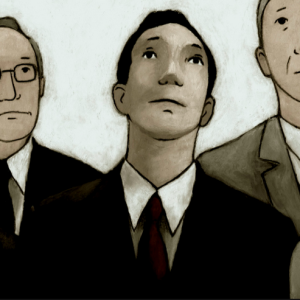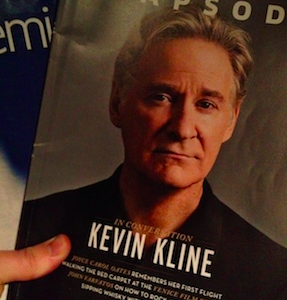Culture has always been class-based. Rich people went to the opera; the poor listened to heavy metal. But what we read and watch and listen to is becoming segmented into more striations with wider gaps between them, reflecting income distribution.
I was thinking about this while reading that ultimate periodical for, by and about the richest one percent: The Sunday New York Times.
The Times is historically elitist: You get lots of reviews of classical music and fine arts, hardly anything about rock, hip-hop or comics. In Timesworld, a $150 dinner qualifies as a moderately expensive meal. A $650 hotel room is something you might actually consider.
But recently I’ve noticed that the gaps between what the Times prints to try to attract the audience targeted by its advertisers and the interests and tastes of most of its upper-middle-class striver readers are getting more pronounced. Just this weekend, I was tearing through the Sunday edition. (Despite lower page counts, it is still a whale of a paper.) I did it in under an hour.
 The Times doesn’t have many pieces I want to read anymore.
The Times doesn’t have many pieces I want to read anymore.
The paper was always a pretentious publication. Now it’s pretentious and blah. The Times delivers too many puff pieces on corporate executives, too many political horserace articles minus actual politics and way too many dreary profiles of boring authors, musicians, etc.
But the really big change in The Times? It’s the tone of the stuff they print.
Good writing draws you in no matter what the topic. A decade or two ago, you could count on The Times, more so than The New Yorker and The Wall Street Journal, to print words strung together in a way that would make you care about anything from asparagus cultivation to arbitrage. Now, not so much. Everything in there reads like it was written by a pod person on a triple dose of Prozac.
The Times is all flat-line affect.
Which, in a way, is interesting — interesting in a dull way but still interesting: You see, to make it as a successful journalist in 2015, you have to be able to make videotaped mass beheadings dull.
This is, in a way, a skill. But who has time to read it?
 So, today I read The Times in a slow-down-to-check-out-the-car-wreck way. And I came across an item that brought home the widening cultural class divide. Here it is:
So, today I read The Times in a slow-down-to-check-out-the-car-wreck way. And I came across an item that brought home the widening cultural class divide. Here it is:
Breaking News! United Airlines has a new in-flight magazine, but it’s only for those who pay top dollar for flights. And it only features the type of literary fiction Timesians like long-time book critic Michiko Kakutani classify as “high-end.”
Good God.
Reports Alexandra Alter:
“As airlines try to distinguish their high-end service with luxuries like private sleeping chambers, showers, butler service and meals from five-star chefs, United Airlines is offering a loftier , more cerebral amenity to its first-class and business-class passengers: elegant prose “
 Alter continues, “There are no airport maps or disheartening lists of in-flight meals and entertainment options in Rhapsody.”
Alter continues, “There are no airport maps or disheartening lists of in-flight meals and entertainment options in Rhapsody.”
But wait. Rich people don’t need airport maps? How do they navigate airports — teleportation?
“Instead,” she writes, “the magazine has published ruminative first-person travel accounts, cultural dispatches and probing essays about flight by more than 30 literary fiction writers.”
She reports a list of authors that includes “literary stars like Joyce Carol Oates, Rick Moody, Amy Bloom, Emma Straub and Doerr, who won the Pulitzer Prize for fiction two years ago.”
I’m glad I’m in Coach. Every one of those writers bores the shit out of me.
To paraphrase the fictional Nazi in Hanns Johst’s play via Mission of Burma, whenever I hear the phrase “literary fiction” I reach for my revolver. Then I run away screaming.
Fiction is good or bad. There is no such thing as non-literary fiction.
 Purveyors of literary fiction sometimes wonder aloud why their non-genre genre doesn’t get more attention (from the marketplace). Though I infrequently observe a relationship between quality and sales, I can answer this question: literary fiction is written for an upper crust, very white, well-educated but not-as-smart-as-they-think sliver of the word-consuming public — whose number is too small to create a Stephanie Meyer-scale bestseller.
Purveyors of literary fiction sometimes wonder aloud why their non-genre genre doesn’t get more attention (from the marketplace). Though I infrequently observe a relationship between quality and sales, I can answer this question: literary fiction is written for an upper crust, very white, well-educated but not-as-smart-as-they-think sliver of the word-consuming public — whose number is too small to create a Stephanie Meyer-scale bestseller.
Ninety years ago, these would be the same people who hate Hemingway.
They hate anyone just for writing non-MFA approved sentences that anyone could read, understand, enjoy — and not notice.
To paraphrase Mark Twain, who argued that any library would be improved simply by the absence of any books by Jane Austen, I will endure United’s cramped coach class more stoically thanks to my awareness that there isn’t a copy of Rhapsody in the seat pocket in front of me.
The Times, again:
A United marketing flack ‘said the quality of the writing in Rhapsody brings a patina of sophistication to its first-class service, along with other opulent touches like mood lighting, soft music and a branded scent.’ “
Gag me with a plastic TSA-approved spoon.
But wait, there’s more …
‘We’re not going to have someone write about joining the mile-high club,’ said Jordan Heller, the editor in chief of Rhapsody. ‘Despite those restrictions, we’ve managed to come up with a lot of high-minded literary content.’”
Listen. There was a time, not long ago, during my own young adulthood, back when upper middle class and upper class people read the same books and magazines. The former aspired to the latter; the latter imagined themselves in touch with the former.
Now there’s literary fiction, a category designed as an exclusion.
In music, this is jazz. In movies, it’s documentaries and art films. It’s NPR and The Times and the Democratic Party.
Today, the rich live in gated communities of the mind. Every house and every person inside them look and talk exactly the same. No weeds on the perfectly manicured lawns.
Just boring, bland, flat bullshit.
As much as they work to keep us out, I know what keeps the cultural one percenters awake at night: Their very real fear that we don’t want to get it.

6 Comments.
I used to read and comment on the New York Times. But the articles all seem to have been written by the US Government Information Office, with (maybe) a little re-writing by the Times stable of Ivy League grads. Then they saw to it that the first page of comments must be from their stable of selected commentators who reflect the Times worship of the current administration (the Times and the comments are allowed to criticise, perhaps severely, former administration who no longer have any power).
So I switched to the Guardian.uk, especially in the heady days when it was the only paper willing to publish Snowden’s revelations (Snowden had learned that, had he approached any US paper, the most felicitous result he might enjoy would be his dismissal as a lazy, aggrieved menial worker with not university degree who was trying to spread patently false tinfoil hat conspiracy theories about the US government, the government that most respects its citizens’ privacy and rights; alternatively, Life without the Possibility of Parole for High Treason after a Top Secret trial.) But the British government shut down the Guardian.uk and it’s now the Guardian.com, which parrots the US/UK government line, and completely changed the focus from news to celebrities and sports (with just a tiny bit of news thrown in).
So I switched to the Independent. The Independent carried the story about the Hersh report as fact on the Front Page. The New York Times ran a short, ‘US Government refutes every detail of story by conspiracy nutcase’ on Page 7. And the Guardian ran a joke column about the tinfoil nutcase who tried to impugn the official US Government version of the brilliant US operation that killed the world’s worst terrorist.
Mr Rall complained about the movie Zero Dark Thirty. When I was in school, we studied Richard III, which dramatised the official account in all the English history books. Later, we were told that the English government forced all those history books to lie about poor Richard. The movie Zero Dark Thirty dramatised the official version of the operation that killed Osama. Hersh says (correctly) that the official version was something out of Wonderland, that nothing about the official version is true except that the Seals killed Osama. Every detail was manufactured.
Which is why I now rely on the Independent.uk as my main source of news.
1) Life is too short for fiction, despite the logical (in)accuracy of adjectives used to describe it.
2) Yes, the NYT and NPR are roughly equivalent: shameless, self-adoring, smug, smarmy stenographers of sadistic empire
3) Can one retch hard enough over the irony of a NYT article ABOUT a “high-end” airline magazine (of all fucking things!) sneering at “A United (airlines) marketing flack”?
4) The REAL rich do not travel in the same fuselage with the hoi polloi … they have their own private jets.
Those among them who read anything besides financial reports presumably have a library, and librarian, on board.
5) The rich need no maps as they have personal navigators to accompany their personal trainers, personal pet groomers, personal automobile elevator operators, personal shoppers, personal literary fiction readers and, we can only assume, personal experiencers of life itself.
> Life is too short for fiction
And yet, I continue to read the ‘news’ 😉
“News,” the cruelest and most dangerous fiction of all.
It’s pretty damned obvious to me that the vast majority of people are fully in Kool-Aid Mode.
Example: Unemployment is down! It’s only about 5.x%. Considerably less than the 13% of the Recession. All the papers are reporting it as the official religion’s dogma.
But …
Graduates can’t find work. Job creation is trending toward lower-pay, fewer benefits, less-full-time, less-stability, etc. Housing prices (and rent prices) are growing FASTER than inflation. Wages are stagnant.
By all external metrics, things are not improving. But the newspapers do not, will not, cannot report that the situation is getting more dire. Rare indeed is the problem that goes away simply by ignoring it. And I do not think this will be one of those rarities. And because the depth of the disaster will be enormous, the correction for it will be equally large.
I love jazz, full disclosure, I am a college jazz director, but I also love Ted Rall cartoons and enjoy reading his journalistic blog. Neither seems designed to be exclusive, but both are, in the sense that both are unpopular compared to the rubbish that earns most of the money in circulation. So, perhaps a more apt comparison would be with over-produced pop music designed to convey a certain credibility to teener-bopper audiences?
I dunno.